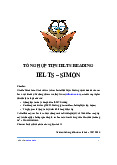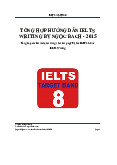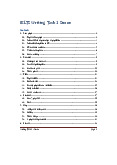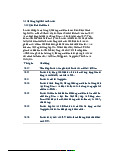







Preview text:
MORPHOLOGY EXERCISES
The questions that follow relate to the lecture notes and exercises for the 'Morphology' topic.
2. Identify the morphemes for each of the following words, in the order that they appear in the word. Word Morphemes Inputs IN PUT -S + + Components COMPONE -S + Elements ELEMENT -S + Indo-European INDO EUROPE -AN + + Persian PERSIA IAN + Within WITH IN + Another AN OTHER + Notable NOTE ABLE +
1(a). From the following list of words, select five words with inflectional morphology.
Click on 'Check Inflectional' to check.
1(b). Clear your answers and then select five words with derivational morphology.
Click on 'Check Derivational' to check. elements example egg such gain feature off cram and great ordering tend unkind have one the as linked morphology these some Indo-European Persians thought case speech killed within
The questions that follow relate to the lecture notes and exercises for the 'Morphology' topic. 1
Consider the following Modern Greek and English sentences (which have the same meaning): O skilos efaye tin pondiki The dog ate the mouse I pondiki efaye to skilo The mouse ate the dog Oi skiloi efagan tis pondikes The dogs ate the mice
Oi pondikes efagan tous skilous The mice ate the dogs To fayito tou skilou... The dog's food... To fayito ton skilon... The dogs' food... To fayito tis pondikis... The mouse's food... To fayito ton pondikon... The mice's food...
Identify all the morphemes in the written forms of the corresponding
Greek and English words for dog and mouse. Some are done for you. 'dog' 'mouse' Greek : English skil+os : DOG Greek : English skil+o : DOG pondik+i : MOUSE+s' skil+ou : DOG+'S pondik+is : mice+s' skil+oi : DOG+S : skil+ous : DOG+S pondik+on : Skilon : dog+s'
Exercise 4.2: Inflectional Affixes
For each of the bold words in the passage from Wallace Stegner's "The Dump Ground" below, label the inflectional suffix: pres =remember, present tense compr =more comparative chooses degree past =should, past tense Brought, supl =most superlative took, judged degree gathered, would prsprt =bringing present Lying, Poss =neighbors’, possessive case participle bringing it’s, somebody’s pstprt =used past participle Renewed, pl =ourselves, plural number returned families, neighbors
The place fascinated us, as it
have. For this was the kitchen midden of all the civilization should
we knew. It gave us the most tantalizing glimpses into our lives and our own; it neighbors' 2
provided an aesthetic distance from whi ch to know ourselves.
The town dump was our poetry and our history. We took it home with us by the
wagonload,bringing back into town the things the town had used and thrown away. Some little part of what we , mainly bottl gathered
es, we managed to bring back to usefulness, but most of
our gleanings we left lying around barn or attic or cellar until in some renewed fury of spring
cleanup our families carted them off to the dump again, to be rescued and briefly treasured by
some other boy. Occasionally something we really valued with a passion was snatched from us in
horror andreturned at once. That happened to the mounted head of a white mountain
goat, somebody'strophy from old times and the far Rocky Mountains, that I brought home one
day. My mother took one look and discovered that his beard was full of moths.
I remember that goat; I regret him yet. Poetry is seldom useful, but always memorable. If I were
a sociologist anxious to study in detail the life of any community I go very early to would its
refuse piles. For a community may be as well judged by what it throws away - what it has to throw away and what it
to - as by any other evidence. For whole civilizations we chooses sometimes have no of t more
he poetry and little more of the history than this (from Wolf Willow1955: 35-36).
Exercise 4.6: Derivational Prefixes and Suffixes
1. Sort the prefixes in the words below into the following seven categories according to meaning: a. Time b. Number c. Place d. Degree e. Privative f. Negative g. Size English: fore-, out-
Latin: post-, bi-, sub-, ultra-, de-, dis-, non-, mal-
Greek: poly-, hyper-, mega-, macro- 3
Each category has two prefixes. After you have classified the prefixes, use a dictionary to
identify whether the prefix is native English, Latin, or Greek in origin. Post-date (Time)
Mal-adjusted (negative) Macrocosm (size) Forewarn(time) Bi-focal (Number) Out-door(place) Hyper-activity Demilitarize (private) (degree) Megawatt (size) Defrost(private) Polyglot (number) Nonentity (negative) Disclose (privative) Foreshadow(time)
Macroeconomics(size Malpractice(negative ) ) Polygon (number) Bisexual(number) Postelection (time) Nonsmoker (negative) Subway (place) Disarm(privative) Megalosaur(size) Outhouse(place)
Ultraconservative(degree Hyperthyroidism(degree Subfloor (place) Ultraviolet (degree) ) )
2. Sort the suffixes in the words below according to their class-changing function. The
categories include the following: (a) N > N
Gangster, polotician, rhetorician, kingdom, stardom, gangster, mobster (b) V > N
Inhabitant, refusal, trial, participant, seizure, closure (c) A > N
Warmth, width, conservatism, idealism, falsehood, likelihood (d) N/A > V
Broaden, straighten, facilitate, vaccinate (e) N > A
Friendless, penniless, historic, syntactic, selfish, boyish (f) V > A
Advisory, contradictory, tireless, thankless (g) N/A > Adv
Stepwise, clockwise, twofold, manifold
(There are two examples of each suffix.) broaden syntactic width idealism participant falsehood closure straighten rhetorician clockwise refusal vaccinate gangster stardom warmth tireless twofold trial accidental selfish advisory likelihood friendless politician conservatism mobster kingdom facilitate inhabitant contradictory boyish seizure manifold stepwise thankless global 4 historic penniless
3. (a) Can you think of a reason why -en may attach to some adjectives, but not to others, as shown below? blacken broaden stiffen ripen deafen tighten soften loosen *thinen *longen *slimen *nearen *slowen *narrowen *highen *holyen *noblen
The reason here is phonological: -en may attach only to monosyllabic adjectives ending in
obstruents (stops and fricatives), not to those ending in vowels, nasals, or liquids.
(b) Can you think of a reason why -ed may attach to some nouns, but not to others, as shown below?
The reason here is semantic: -ed may attach only to adjectives denoting inalienable
possession (things that are possessed intrinsically) and not to those denoting alienable
possession (things that may be separated from the possessor brown-haired kind-hearted low-spirited left-handed narrow-minded strong-headed
*brown-coated *heavy-pursed *long-skirted *one-childed *two-catted *silly-hatted
4. Which is the proper derivation of unknowledgeable? Explain. (a)
This is incorrect because un- does not attach to nouns; it produces the nonword of English *unknowledge. 5 (b)
This is correct; every stage in the derivation produces a word of English. (c)
This is incorrect because while un- does attach to verbs, this also produces the nonword of English *unknowledge. Exercise 4.8: Compounding
1. Identify the syntactic pattern in each of the following compounds and express it in a lexical rule. gravedigger N + Example: V + -er > N (a) hovercraft
(m) dugout V+-en+ prt >N (y) Lukewarm A+A >A V+-er+N >N (b) dairyman
(n) Hard-heart-ed [ A+N+- (z) law-abiding N+N>N ed] N+V+-ing > A (c) bath-towel (o) homesick [N-A] (aa) far-reaching A+V+ ing N+N>N > A (d) goldfish (p) proofread [N-V] (bb) Homemade N+V+en N+N>N >A (e) inroads
(q) overqualified [A-V-ED] (cc) clean-cut A+V+ en > A A+N+-s> N (f) bystander (r) Overachieve (dd) fighter-bomber Adv+V+er>N Prt + V >V V + -er + V + -er > N 6 (g) Setback (s) badmouth (ee) Earthenware V+ prt > N A + N >V N + -en + N > N
(h) meltdown V + Prt > (t) Redhead (ff) driver's seat N A + N > N V + -er + ‘s + N > N (i) blackout (u) birth control (gg) baking powder V + Prt > N N + N/V > N/A V + -ing + N > N (j) stand-in (v) breakfast (hh) drip-coffee V + Prt > N V + N > N V + N > N (k) Turnout (w) thoroughgoing (ii) Wisecrack V + Prt > N A + V + -ing > A A + V > V/N (l) money-hungry (x) quick-change (jj) Snowplow N+A >A A + V > A N + V/N > V/N
2. The following words are compounds which also include derivational affixes. Analyze
the words, identifying the roots and their parts of speech, as well all the affixes and
their function as nominalizer, verbalizer, adjectivalizer, or adverbializer. housekeeper Example:
house (root - noun) + keep (root - verb) + -er (nominalizer) (a) Flightworthiness
flight (root – noun) + worth (root – noun) + -y (adjectivalizer) + - ness ( nominalizer) (b) Chatterbox
chat (root - verb) + -er (nominalizer) + box (root - noun) (c) owner-occupied
own (root-verb)+ -er (nominalizer)+ occupy (root-verb)+ -ed (past participle) (d) freedom-loving
free (root - adjective) + -dom (nominalizer) + love (root - verb) + -ing (present participle) (e) Handicraft
hand (root - noun) + -y (adjectivalizer) + craft (root - noun) (f) broken-hearted
break (root - verb) +-en (past participle/adjectivalizer)+heart (root - noun) +-ed (adjectivalizer) (g) safety-tested
safe (root - adjective) + -ty (nominalizer) + test (root - verb) + -ed (past 7 participle/adjectivalizer) (h) worldly-wise
world (root - noun) +-ly (adjectivalizer) +wise (root - adjective) (i) Antiaircraft
anti -(prefix) + air (root - noun) + craft (root - noun) (j) machine-readable
machine (root - noun) + read (root - verb) + -able (suffix - adjectivalizer) (k) chartered accountant
charter (root - noun) +-ed (suffix - adjectivalizer) +account (root verb) +-ant (suffix nominalizer)
3. (a) Look at the following set of words naming berries. The second half of each is the
recognizable root berry. Can you analyze these as compounds?
blueberry blackberry cranberry marianberry
strawberry raspberry loganberry
Does a more recent formation such as cranapple provide evidence for or against these forms as compounds?
(b) A problem of morphological analysis arises for forms such as the following: fish-monger broadcaster gossip-monger sportscaster scandal-monger newscaster ironmonger war-monger Are these forms compounds? 8




